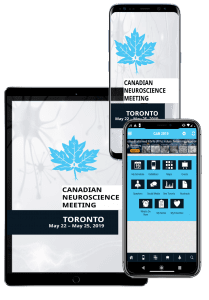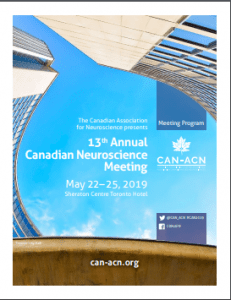 Download the Full program PDF:
Download the Full program PDF:


CAN Meeting app
All program information and abstract listings are available now on the CAN-ACN app! Search for CAN-ACN or Canadian Association for Neuroscience in the App Store or Google Play or scan our QR code.
Satellite symposia
May 20-22 and May 26, view listing here
Tuesday, May 21, 2019
| 6:30 – 8:00PM |
Canadian Association for Neuroscience 2019 Public Lectures
Location: SickKids Peter Gilgan Centre for Research and Learning Auditorium
Speaker : Geoffrey Hinton | University of Toronto
Host: Blake Richards | University of Toronto
Does the brain do backpropagation?
More information and free tickets |
Wednesday, May 22, 2019
| 9:00 AM – 4:30 PM |
CAN Satellite symposia |
|
5:00 – 5:15 PM |
Welcome and Opening Remarks by
Jaideep Bains, President of the Canadian Association for Neuroscience |
|
5:15 – 5:30 PM |
News from CIHR’s Institute of Neurosciences, Mental Health and Addiction
Sam Weiss, Scientific Director, CIHR Institute of Neurosciences, Mental Health and Addiction |
|
5:30 – 5:40 PM |
Working together: Neurological Health Charities Canada and Canadian Brain Health Strategy
Deanna Groetzinger, Manager, Public Affairs & Partnerships, Neurological Health Charities Canada |
| 5:40 – 6:40 |
Keynote Lecture:
Michelle Monje | Stanford University
Myelin plasticity in health and disease
Sponsored by the the SickKids Centre for Brain & Mental Health
and
the SickKids Neurosciences & Mental Health program
|
| 6:40 – 8:00 |
Opening Reception |
Thursday, May 23, 2019
| 8:30 – 10:15 AM
|
Plenary symposium 1: Pain: More than a feeling
Chair: Tuan Trang | University of Calgary
Speakers:
Catherine Cahill | UCLA
Intersection between pain and addiction: implications for kappa receptors
Laura Stone | McGill University
Pain Epigenetics: What is it and why should anyone care?
Loren Martin | University of Toronto
Learning mechanisms of pain and pain relief |
| 10:15 – 10:45 |
Coffee break
Posters/exhibits |
| 10:45 – 11:45 |
Featured Plenary speaker:
Jeffrey Mogil | McGill University
Pain in Mice and Man: Ironic Adventures in Translation
|
| 11:45 – 12:00 |
Advocacy Award presentation
Ottawa Chapter of the Society for Neuroscience
|
| 12:00 – 1:30 |
Lunch on own
Equity, Diversity and Inclusion luncheon
Sponsored by BrainsCAN at Western University |
|
1:30 – 3:00 |
Parallel symposium 1: Peripheral and central mechanisms of sensory information processing.
Chair: Michael Gordon | University of British Columbia
Sponsored by the Djavad Mowafaghian Centre for Brain Health
Presenters:
- Gautam Awatramani | University of Victoria
Precise subcellular coordination of excitation and inhibition supports micron-scale dendritic computations
- Molly Stanley | University of British Columbia
Unique properties of salt taste coding and state-dependent behavioral output in Drosophila
- Stuart Trenholm | McGill University
Flexible feature encoding in visual cortex
- Maurice Chacron | McGill University
Mechanisms underlying adaptive optimized coding of natural stimuli
Parallel symposium 2: The neural basis for social decision-making
Chairs: Toni-Lee Sterley | University of Calgary & John P. Christianson | Boston College
Presenters:
- Brian Trainor | UC Davis
Oxytocin in the bed nucleus of the stria terminalis facilitates social anxiety
- Toni-Lee Sterley | University of Calgary
The role of corticotropin-releasing hormone neurons in the paraventricular nucleus of the hypothalamus in social transmission of stress
- Morgan Rogers-Carter | Boston College
Insular cortex projections to nucleus accumbens core mediate social approach
- Zoe Donaldson | University of Colorado Boulder
Neuronal signature of monogamous reunion in prairie voles
Parallel symposium 3: Neural stem cells in neural development and repair
Sponsored by the International Society for Developmental Neuroscience
Chair: Soheila Karimi | University of Manitoba
Presenters:
- Carol Schuurmans | University of Toronto
Elucidating the molecular control of neural stem cell maintenance in the embryonic neocortex
- Jeff Biernaskie | University of Calgary
Clarifying the identity of adult neural stem cells
- Anastassia Voronova | University of Alberta
Role of interneuron-secreted signals in neural stem cell-mediated oligodendrocyte genesis in the developing and adult brain
- Soheila Karimi | University of Manitoba
Novel mechanisms of neural stem cell regulation in spinal cord injury
Parallel symposium 4: Circuit and synaptic approaches to study stress | depression and antidepressants
Sponsored by the CERVO Brain Research Centre
Chair: Argel Aguilar Valles | Carleton University
Presenters:
- Wataru Inoue | University of Western Ontario
Intrinsic plasticity as a neural correlates for stress habituation
- Mary Kay Lobo | University of Maryland
Molecular mediators of dendritic atrophy regulate stress susceptibility
- Anita Autry | Howard Hughes Medical Institute
Impact of stress on parental behavior: potential insights for Post-partum mental illness
- Argel Aguilar Valles | Carleton University
Translational control of the antidepressant effect of ketamine and its metabolite hydroxynorketamine
|
| 3:00 – 3:30 |
Coffee break |
| 3:30 – 5:30PM |
Poster session 1 & Exhibits
Sponsored by the International Society for Developmental Neuroscience |
| 5:30 – 7:00 |
Brain Prize lecture:
The Molecular basis of Hebb synapses
Speaker: Graham Collingridge | University of Toronto | Winner of the 2016 Brain Prize
Introduction by Kim Krogsgaard, Director of The Brain Prize at Lundbeck Foundation
Sponsored by the Lundbeck Foundation |
| 7:30 – 9:30 |
CAN Student Social
Sponsored by Neurolabware |
Friday, May 24, 2019
| 8:30 – 10:15 AM
|
Plenary symposium 2: Underlying Principles of Animal Behaviors
Sponsored by the Lunenfeld-Tanenbaum Research Institute
Chair: Mei Zhen | University of Toronto
Speakers:
Marla Sokolowski | University of Toronto
Unravelling Gene-Environment Interplay on Behaviour
Simon Chen | University of Ottawa
Dissecting Neural Circuits Underlying Delayed Motor Learning in the 16p11.2 Deletion Mouse Model of Autism
Sarah Woolley | McGill University
Plasticity of acoustic preferences in female songbirds |
| 10:15 – 10:45 |
Coffee break
Posters/exhibits
Sponsored by the University of Ottawa |
| 10:45 – 11:45 |
Featured Plenary speaker:
Florian Engert | Harvard University
Neural correlates of perceptual decision-making in larval zebrafish
|
| 11:45 – 12:00 |
Advocacy Award presentation
SINAPSE (Service and Outreach Initiatives for Progressive and Positive Neuroscience)
|
| 12:00 – 1:30 |
Lunch on own |
1:30 – 3:00
|
Parallel symposium 5: Emotions and behavioural responses in normal and pathological states
Sponsored by Tucker-Davis Technologies
Chair: Christophe Proulx | Université Laval
Presenters:
- Christophe Proulx | Université Laval
Role of lateral hypothalamus neural outputs in behavioural responses
- Erin Calipari | Friedman Brain Institute
Neural circuit control of sex-differences in valence-based decision making
- Bo Li | Cold Spring Harbor Laboratory
Ventral pallidal neurons in reward seeking and punishment avoidance
- Stephan Lammel | UC Berkeley
Anatomical, molecular and functional heterogeneity of the lateral habenula defines a distinctive depression subtype
Parallel symposium 6: Novel approaches to understanding genetic underpinnings of Autism Spectrum Disorder
Sponsored by the International Society for Developmental Neuroscience
Chair: Catharine Rankin | University of British Columbia
Presenters:
- Melanie Woodin | University of Toronto
Regulation of KCC2 as a target for treatment of Autism
- Karun Singh | McMaster University
Using integrative proteomics to identify Autism spectrum disorder signaling networks in mammalian models
- Catharine Rankin | University of British Columbia
Systematic phenomics analysis of ASD-associated genes defines novel shared and unique functions and identifies parallel genetic networks underlying hypersensitivity and impaired habituation
- Kurt Haas | University of British Columbia
A multi-model system approach to functional variomics of ASD-associated missense mutations of PTEN
Parallel symposium 7: Atypical roles for NMDA receptors in physiology and disease
Sponsored by the CERVO Brain Research Centre
Chair: Roger Thompson | University of Calgary
Presenters:
- Per Jesper Sjöström | McGill University
Unorthodox NMDA receptor signalling in neocortical plasticity
- Kim Dore | UC San Diego
Metabotropic NMDA receptor signaling underlies synaptic depression and dysfunction
- Robert Bonin | University of Toronto
Non-canonical NMDA signaling in pain plasticity and reconsolidation
- Laura Palmer | University of Calgary
A surprising neuroprotective role for amyloid beta during ischemia
Parallel symposium 8: Multi-species approaches to the mammalian social brain
Chair: Nathan Insel | University of Montana
Presenters:
- Annaliese Beery | Smith College
Life in groups: selectivity and reward in vole relationships
- Melissa Holmes | University of Toronto
Social influences on development in naked mole-rats
- Nathan Insel | University of Montana
Investigating social learning in degus
- Michael Yartsev | UC Berkeley
Neurobiological investigation of vocal production in the social mammalian brain
|
| 3:00 – 3:30 |
Coffee break |
| 3:30 – 5:30 |
Posters session 2 and Exhibits
Sponsored by the University of Ottawa Brain and Mind Research Institute |
| 5:30 – 6:00 |
Young investigator award lecture
Sponsored by The Neuro |
| 6:00 – 7:00 |
Presidential Lecture:
Sponsored by the Hotchkiss Brain Institute
Robert Malenka | Stanford University
Neural mechanisms of social reward
|
Saturday, May 25, 2019
| 8:30 – 10:15 A.M. |
Plenary symposium 3: Stem cells and Organoids: developmental mechanisms, aging and disease modeling
Sponsored by the International Society for Developmental Neuroscience
Chair: Armen Saghatelyan | Université Laval
Speakers :
- Armen Saghatelyan | Université Laval
Division of stem cells in freely behaving mice: dynamic and regulatory mechanisms
- David Kaplan | SickKids Hospital
Growth factor regulation of neural stem cells in normal and pathological conditions
- Yun Li | SickKids Hospital
Modeling neural development and disorders in human neurons and brain organoids
|
| 10:15 – 10:45 |
Posters/exhibits
Coffee break |
| 10:45 – 11:45 |
Featured Plenary speaker:
Guo-Li Ming | University of Pennsylvania
Modeling human brain development and developmental diseases using hiPSCs
|
| 12:00 – 12:30 PM |
CAN-ACN Annual General Meeting of members |
| 12:30 – 1:30 PM |
Lunch on own |
| 1:30 – 3:30
|
Posters session 3 & Exhibits |
| 3:30 – 5:00 |
Parallel symposium 9: Heterogeneous mechanisms underlying hippocampal synaptic plasticity
Sponsored by the CERVO Brain Research Centre
Chair: Timothy Kennedy | The Neuro | McGill University
Presenters:
- Anne McKinney | McGill University
Lysosomal inhibition rescues hippocampal neuronal plasticity impaired by a Christianson Syndrome mutation in SLC9A6
- Elizabeth Chan | Brain Research Centre | University of British Columbia
The role of netrin 1-DCC signaling in regulating GABAAR homeostatic plasticity
- Stephen Glasgow | The Neuro | McGill University
Guiding synaptic plasticity: a novel role for netrin-1 in the adult hippocampus
- Jean-Claude Beique | University of Ottawa
Homeostatic control of plasticity rules at CA1 synapses
Parallel symposium 10: Growing Up High: Neurobiological Consequences of Adolescent Cannabis Use
Sponsored by the International Society for Developmental Neuroscience
Chair: Jibran Khokhar | University of Guelph
Presenters:
- Patricia Conrod | Université de Montréal
Longitudinal relationship between adolescent cannabis use and cognitive development
- Steven Laviolette | University of Western Ontario
Adolescent THC Exposure Induces Molecular and Neuronal Neuropsychiatric Endophenotypes in the Mesocorticolimbic Circuitry
- Iris Balodis | McMaster University
The neurobiology of effort-based decision-making in cannabis use disorder
- Jibran Khokhar | University of Guelph
Long-Term Consequences of Adolescent Cannabinoid Exposure: A Closer Look at Learning and Circuitry
Parallel symposium 11: Novel ventral hippocampus circuits in the control of affective behavior
Chair: Maithe Arruda Carvalho | University of Toronto Scarborough
Presenters:
- Christoph Anacker | Columbia University
Hippocampal neurogenesis and stress resilience
- Rutsuko Ito | University of Toronto Scarborough
Ventral hippocampal contributions to learned approach-avoidance conflict processing
- Mazen Kheirbek | University of California San Francisco
Encoding of emotionally relevant stimuli in ventral hippocampal circuits
- Maithe Arruda-Carvalho | University of Toronto Scarborough
Maturation of brain circuits involved in emotional learning
Parallel symposium 12: Single-cell transcriptomic approaches for dissecting neurological disease and complex behaviours
Chair: Shreejoy Tripathy | University of Toronto
Sponsored by the Djavad Mowafaghian Centre for Brain Health
Presenters:
- Vilas Menon | Allen Institute for Brain Science
Single-cell RNA-seq identifies putative human brain cell types associated with neurodegenerative disease
- Shreejoy Tripathy | University of Toronto
Using single-cell transcriptomics to infer multi-modal cellular phenotypes
- Megan Crow | Cold Spring Harbor Laboratory
Mapping transcriptomically-similar cell types across datasets, species, and conditions using MetaNeighbor
- Mark Cembrowski | University of British Columbia
Subtype-specific predisposition of granule cell participation in hippocampal processing
|
| End of Meeting |
 Download the Full program PDF:
Download the Full program PDF:

